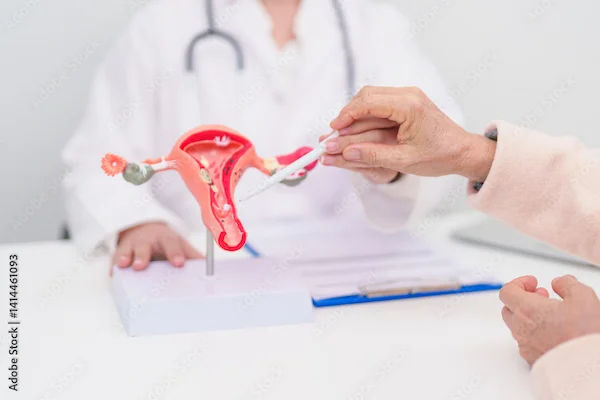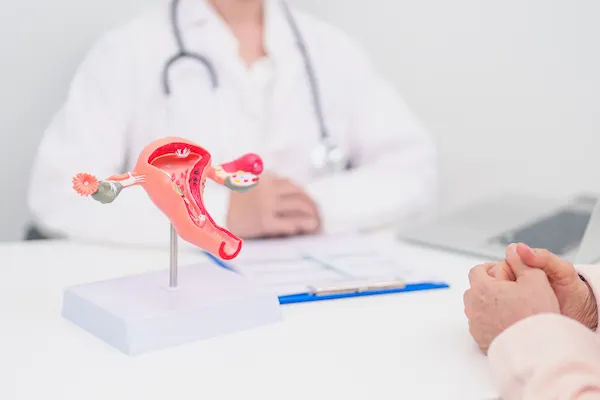Understanding PCOD: Symptoms, Causes, and Diagnosis
Know about the pcod, symptoms, causes, diagnosis and tips for management and along with treatment options.

Written by Dr. M L Ezhilarasan
Reviewed by Dr. Rohinipriyanka Pondugula MBBS
Last updated on 28th Aug, 2025

Introduction
Polycystic Ovarian Disorder (PCOD) is a common hormonal condition that affects many women, especially during their reproductive years. If you or someone you know has been diagnosed with PCOD or suspects they might have it, this article will help you understand the condition better—its symptoms, causes, and how it is diagnosed.
What is PCOD?
PCOD is a hormonal imbalance where the ovaries produce higher-than-normal levels of male hormones (androgens). This can lead to irregular menstrual cycles, cysts in the ovaries, and difficulties with fertility. While the exact cause is still unclear, genetics, insulin resistance, and lifestyle factors play a significant role.
Consult a Gynaecologist for Personalised Advice
Common Symptoms of PCOD
PCOD affects women differently, but some common signs include:
- Irregular periods – Delayed, infrequent, or very heavy periods.
- Excess hair growth (hirsutism) – On the face, chest, or back due to high androgen levels.
- Acne and oily skin – Hormonal imbalances can cause persistent acne.
- Weight gain – Many women with PCOD struggle with obesity or difficulty losing weight.
- Hair thinning or male-pattern baldness – Thinning hair on the scalp.
- Darkening of skin – Patches of dark skin, especially around the neck and underarms.
- Difficulty getting pregnant – PCOD is a leading cause of infertility due to irregular ovulation.
If you notice these symptoms, it’s best to consult a doctor for proper diagnosis and management.
What Causes PCOD?
While the exact cause is unknown, several factors contribute to PCOD:
- Hormonal Imbalance – High levels of androgens (male hormones) disrupt ovulation.
- Insulin Resistance – Many women with PCOD have insulin resistance, leading to higher blood sugar and weight
gain. - Genetics – If your mother or sister has PCOD, you may be at a higher risk.
- Lifestyle Factors – Poor diet, lack of exercise, and stress can worsen symptoms.
How is PCOD Diagnosed?
There’s no single test for PCOD. Doctors usually diagnose it based on:
- Medical History & Symptoms – Discussing irregular periods, weight changes, and other signs.
- Physical Exam – Checking for excess hair growth, acne, or skin darkening.
- Blood Tests – Measuring hormone levels (androgens, insulin, thyroid, etc.).
- Ultrasound (Pelvic Scan) – To check for cysts in the ovaries.
If you suspect PCOD, you can book a consultation or schedule tests through Apollo 24|7 for a proper diagnosis.
Get Your Health Assessed
Managing PCOD: Lifestyle & Treatment Options
While PCOD has no cure, symptoms can be managed effectively with lifestyle changes and medical treatment.
1. Healthy Diet
- Eat high-fibre foods (vegetables, whole grains, fruits).
- Choose lean proteins (chicken, fish, lentils).
- Avoid sugary and processed foods to control insulin levels.
- Include healthy fats (nuts, seeds, olive oil).
2. Regular Exercise
- 30 minutes of daily activity (walking, yoga, strength training) helps regulate hormones and weight.
3. Stress Management
- Practice meditation, deep breathing, or hobbies to reduce stress, which can worsen PCOD.
4. Medical Treatments
- Birth control pills – Regulate periods and reduce androgen levels.
- Metformin – Helps with insulin resistance.
- Fertility treatments – If trying to conceive.
5. Natural Remedies
- Spearmint tea – May help reduce excess hair growth.
- Cinnamon supplements – Can improve insulin sensitivity.
When to See a Doctor?
If you experience irregular periods, unexplained weight gain, or fertility issues, consult a doctor. Early diagnosis and
management can prevent complications like diabetes, heart disease, and infertility.
Final Thoughts
PCOD is manageable with the right approach, healthy eating, exercise, and medical guidance. If you suspect PCOD, don’t hesitate to seek help. You can book a consultation or diagnostic tests through Apollo 24|7 for expert care.
Consult a Gynaecologist for Personalised Advice
Consult a Gynaecologist for Personalised Advice

Dr. Kumar Gubbala
Gynaecological Oncologist
7 Years • MBBS, MRCOG
Chennai
Apollo Proton Cancer Center, Chennai
(25+ Patients)

Dr Bhawna Garg
Gynaecological Oncologist
26 Years • MBBS, MS, (PGI MS ROHTAK) FELLOWSHIP GYNECOLOGY ONCOLOGY, (CANCER INSTITUTE CHENNAI)
Delhi
Apollo Hospitals Indraprastha, Delhi

Dr. Rupam Manna
Radiation Specialist Oncologist
4 Years • MBBS MD(RADIO THERAPY)
Barasat
Diab-Eat-Ease, Barasat

Dr. Sushith C
General Physician
2 Years • MBBS
Bengaluru
PRESTIGE SHANTHINIKETAN - SOCIETY CLINIC, Bengaluru

Dr. Sreeparna Roy
Obstetrician and Gynaecologist
8 Years • MBBS , MS (OBSTETRICS & GYNAECOLOGY), Fellowship in Infertility, Endoscopy & Ultrasonography), Fellowship in Laparoscopy & Hysteroscopy,DRM
Kolkata
Dr Utsa Basu Clinic, Kolkata
Consult a Gynaecologist for Personalised Advice

Dr. Kumar Gubbala
Gynaecological Oncologist
7 Years • MBBS, MRCOG
Chennai
Apollo Proton Cancer Center, Chennai
(25+ Patients)

Dr Bhawna Garg
Gynaecological Oncologist
26 Years • MBBS, MS, (PGI MS ROHTAK) FELLOWSHIP GYNECOLOGY ONCOLOGY, (CANCER INSTITUTE CHENNAI)
Delhi
Apollo Hospitals Indraprastha, Delhi

Dr. Rupam Manna
Radiation Specialist Oncologist
4 Years • MBBS MD(RADIO THERAPY)
Barasat
Diab-Eat-Ease, Barasat

Dr. Sushith C
General Physician
2 Years • MBBS
Bengaluru
PRESTIGE SHANTHINIKETAN - SOCIETY CLINIC, Bengaluru

Dr. Sreeparna Roy
Obstetrician and Gynaecologist
8 Years • MBBS , MS (OBSTETRICS & GYNAECOLOGY), Fellowship in Infertility, Endoscopy & Ultrasonography), Fellowship in Laparoscopy & Hysteroscopy,DRM
Kolkata
Dr Utsa Basu Clinic, Kolkata







